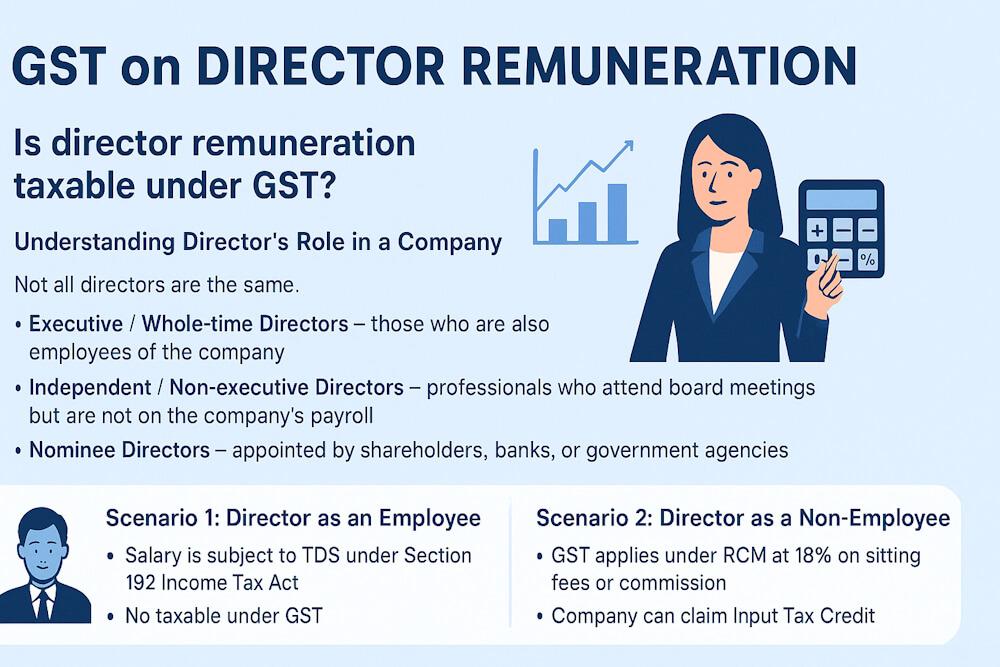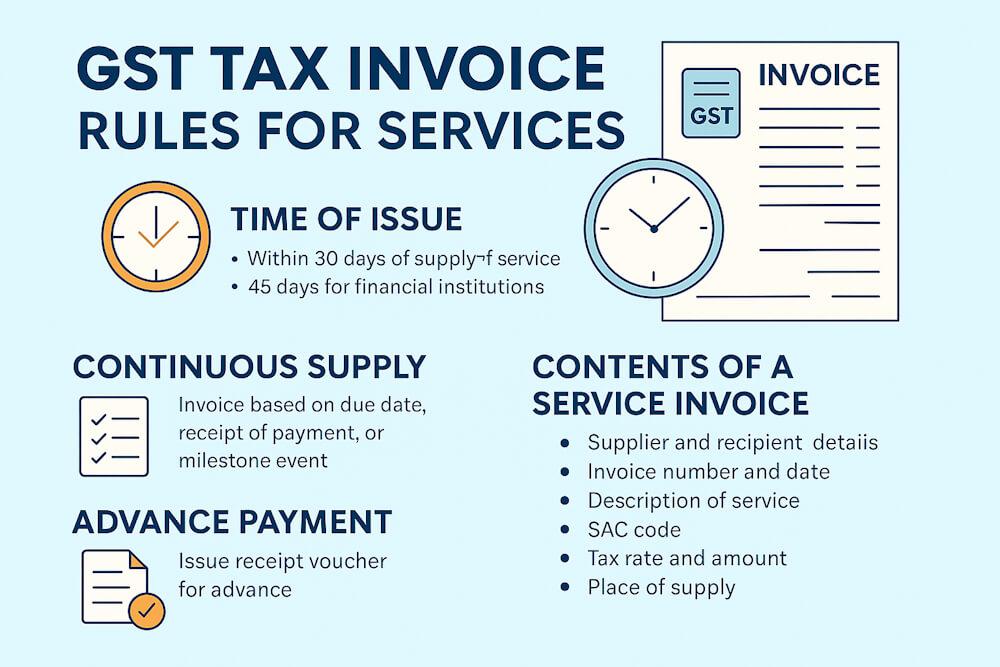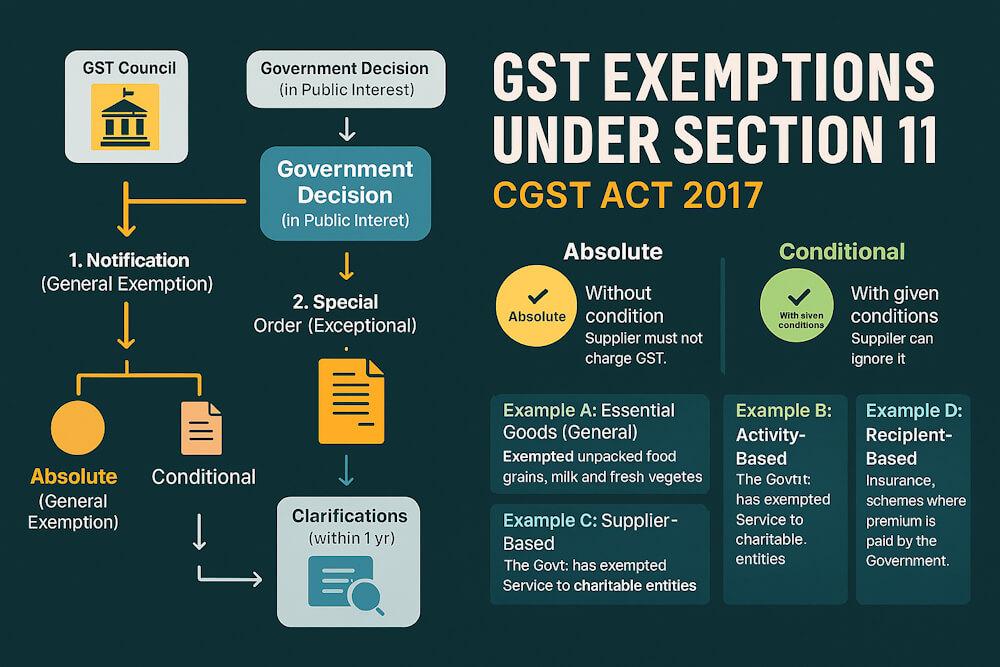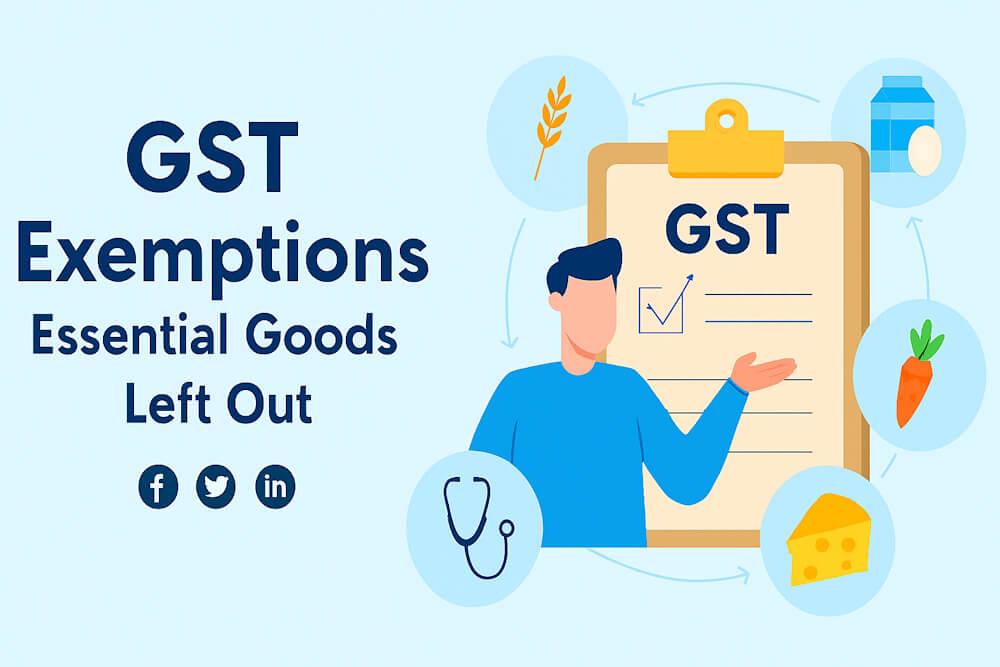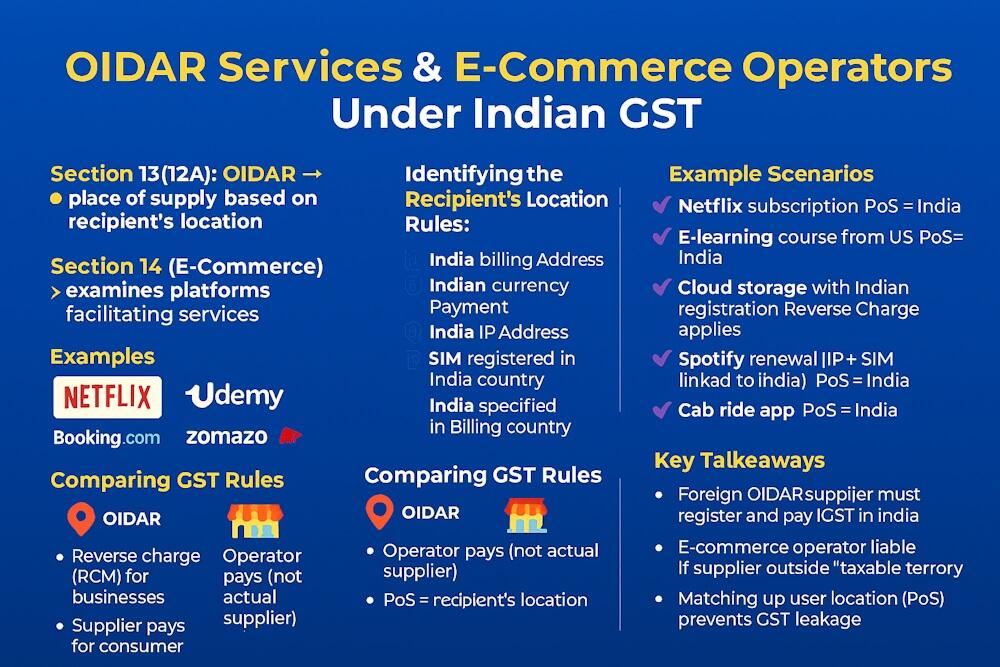1. Introduction
When the Goods and Services Tax (GST) came into effect in 2017, it changed how we look at almost every business transaction — including how companies pay their directors.
But one question has confused businesses ever since: “Is director remuneration taxable under GST?”
At first glance, it might sound straightforward — but it’s not. Some parts of a director’s payment are taxable, and others aren’t.
To clear up this confusion, the Central Board of Indirect Taxes and Customs (CBIC) issued Circular No. 140/10/2020 – GST, dated 10th June 2020.
This circular explains how to distinguish between salaried directors and independent directors, and how GST applies in each case. Let’s break it down in simple, human language.
2. Understanding Director’s Role in a Company
Before diving into GST, let’s get one thing straight — not all directors are the same.
Under the Companies Act, 2013, there are different types of directors:
- Executive / Whole-time Directors – those who are also employees of the company.
- Independent / Non-executive Directors – professionals who attend board meetings but are not on the company’s payroll.
- Nominee Directors – appointed by shareholders, banks, or government agencies.
The type of director determines how GST is applied on the money they receive.
3. Why the Confusion Arose
The confusion started because GST law treats services provided by a director as a taxable supply under the Reverse Charge Mechanism (RCM).
At the same time, income tax law treats some directors as employees, meaning their salary is subject to TDS under Section 192 (salaries) and not as professional fees.
So, the question was: If a company already deducts TDS on salary, should it still pay GST under reverse charge?
That’s what Circular 140/10/2020 was meant to clarify.
4. The Legal Framework
Here’s what the GST law says about it:
Under Section 9(3) of the CGST Act, 2017, certain services are taxable under Reverse Charge Mechanism (RCM). The government issued Notification No. 13/2017 – Central Tax (Rate) listing the services covered under RCM.
One of the items listed is:
“Services supplied by a director of a company or a body corporate to the said company or body corporate.”
In short — companies are required to pay GST on director services under RCM, unless it’s a case of employer-employee relationship.
5. The Clarification from Circular No. 140/10/2020
To remove all confusion, CBIC clarified the issue through this circular.
Here’s the key takeaway:
“If a director is an employee of the company, GST does not apply on the salary paid to them. But if the director is not an employee (like an independent or nominee director), GST applies under RCM.”
So the distinction depends on the nature of the relationship — employer-employee or independent service provider.
6. Two Scenarios Explained
Scenario 1: Director as an Employee (Executive / Whole-Time Director)
If the director works in the company as a full-time employee — drawing a fixed monthly salary, eligible for benefits like PF, gratuity, and leave — then it’s treated as an employer-employee relationship.
In this case:
- The salary is subject to TDS under Section 192 (Income Tax Act).
- The payment is not considered a supply of service under GST (as per Schedule III of the CGST Act).
- No GST is payable on such salary.
Example: Mr. A is a full-time Managing Director of XYZ Pvt. Ltd. He receives a monthly salary of ₹2,00,000, and the company deducts TDS under section 192. Since it’s a salary paid under an employment contract, GST does not apply.
Scenario 2: Director as a Non-Employee (Independent / Nominee Director)
If the director provides services to the company in a professional capacity — such as attending board meetings or giving expert advice — and receives sitting fees or commission, that is not salary.
Such payments are subject to TDS under Section 194J (professional fees).
In this case:
- The director is not an employee.
- The company must pay GST under Reverse Charge Mechanism (RCM) at 18%.
- The company can claim Input Tax Credit (ITC) for the GST paid.
Example: Ms. B is an Independent Director in ABC Ltd. She receives ₹50,000 as sitting fees for attending board meetings. ABC Ltd. must pay 18% GST under RCM on ₹50,000 = ₹9,000. Later, the company can claim ITC of ₹9,000.
7. How to Identify Employer–Employee Relationship
The easiest way to determine whether a director is an employee is to check how TDS is deducted and how the relationship is defined in company records.
| Parameter | Employee Director | Independent Director |
| TDS Section | Section 192 (Salary) | Section 194J (Professional fees) |
| Relationship | Employer–Employee | Principal–Consultant |
| Taxable under GST | ❌ No | ✅ Yes (under RCM) |
| Eligible for PF, gratuity, leave benefits | Yes | No |
| Example | Managing Director | Independent Director |
If the payment is treated as salary under the Income Tax Act, it’s outside GST. If it’s treated as professional fees, GST applies under RCM.
8. GST Rate and Payment under RCM
When GST applies on director services under RCM, the applicable rate is 18% (9% CGST + 9% SGST).
Example Calculation:
- Director fees paid: ₹1,00,000,
- Applicable GST rate: 18%
- GST payable: ₹18,000
The company pays ₹18,000 under RCM and then claims the same amount as input tax credit (ITC), if used for business purposes.
9. Input Tax Credit (ITC) for Company
Companies that pay GST under RCM on director services can claim ITC, provided:
- The director’s services are used for business operations, and
- Proper documentation is maintained (self-invoice, RCM payment details, etc.)
So while GST must be paid first under RCM, it doesn’t become a cost to the company in the long run.
10. Compliance Requirements
Companies need to follow a few steps to stay compliant when paying director remuneration under RCM:
- Identify the director type – employee or non-employee.
- Check TDS category – Section 192 or 194J.
- If RCM applies:
- Calculate GST at 18%.
- Create a self-invoice under Rule 46 (since director doesn’t issue invoice).
- Pay GST in GSTR-3B under the RCM column.
- Claim ITC in the same return (if eligible).
This ensures clean records and avoids penalties later.
11. Common Mistakes Businesses Make
Even large companies have made errors on this topic. Here are some common ones:
- Paying GST under RCM even for salaried directors (not needed).
- Missing RCM payments for independent directors (required).
- Confusing director sitting fees with salary.
- Not creating self-invoices for RCM compliance.
A simple review of your TDS records usually helps identify whether GST applies or not.
12. Circular 140/10/2020 – Key Highlights (Simplified)
Here’s a quick summary of what the circular clarified:
| Type of Payment | Nature of Relationship | TDS Section | GST Applicability |
| Salary to Executive/Whole-time Director | Employer–Employee | Sec. 192 | ❌ Not under GST |
| Sitting Fees, Commission, Professional Fees | Independent/Non-executive Director | Sec. 194J | ✅ Taxable under RCM |
So, the deciding factor is whether the director’s payment is salary (employment) or professional service (independent).
13. Why the Clarification Was Important
Before this circular, different tax officers had different interpretations — some treated all director payments as taxable under GST.
This led to confusion, unnecessary RCM payments, and compliance disputes.
After Circular 140/10/2020, the rule became crystal clear and uniform across India, helping companies correctly identify when GST applies.
14. Final Thoughts
The GST on director remuneration issue is a great example of how tax laws can get tricky even for simple transactions.
Thanks to Circular No. 140/10/2020, we now have clarity:
- If the director is an employee, salary is outside GST.
- If the director is independent, fees are taxable under RCM.
This distinction ensures fairness — protecting genuine employer-employee salaries from double taxation while keeping professional services within the GST net.
For businesses, the key is to maintain clear documentation, ensure proper TDS deduction, and follow RCM compliance where needed.
It’s all about doing it right — not paying more than what’s required, but also not missing what’s due.
